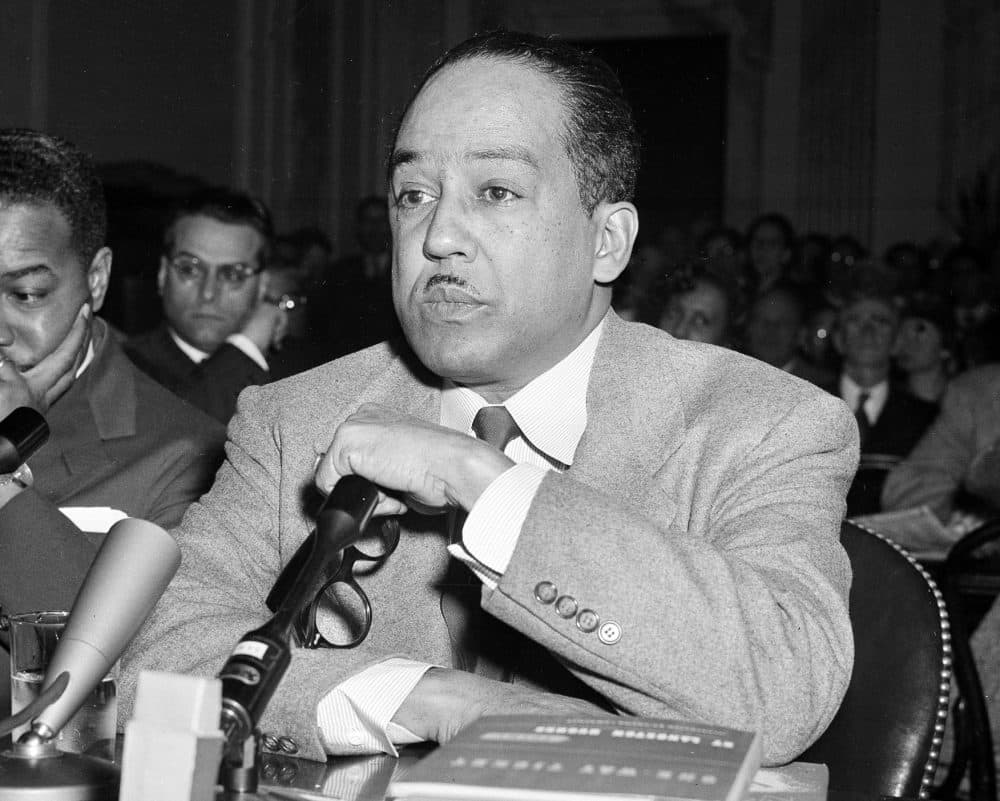Advertisement
Langston Hughes, Nella Larsen Books Among 6 Republished To Honor Black History Month

Penguin Classics is republishing six books by African-American authors to honor Black History Month:
- "Passing," by Nella Larsen
- "Black No More," by George S. Schuyler
- "The Souls of Black Folk," by W.E.B. Du Bois
- "Amiable with Big Teeth," by Claude McKay
- "Not Without Laughter," by Langston Hughes
- "The Blacker the Berry..." by Wallace Thurman
Here & Now's Robin Young speaks with editor John Siciliano and novelist Angela Flournoy (@angelaflournoy). Flournoy wrote the new introduction for "Not Without Laughter."
Interview Highlights
On Hughes' novel "Not Without Laughter," published in 1930
Angela Flournoy: "I'd never actually read the book before I was approached to write this introduction, which was exciting. I discovered, weirdly, that it had a lot in common with my own novel as far as being about family and being about the Midwest, and in some ways, being about the Great Migration and this tension between those who kind of leave the rural South, and even though they're kind of halfway between the North and the South, it still feels very Southern, and the way that they're living. And those who go to the more industrial North, and also just the kind of quiet moments, just focusing on the family, not really trying to explain anything about how they lived, but just depicted, was something I had not expected Hughes to be doing in 1930, so that was really delightful."
"I find it really humbling and grounding and fortifying to read these works, because it helps me understand that being the first isn't really important, as far as figuring out a way to further the conversation."
Angela Flournoy
On the works reflecting the idea that if African-Americans lived a certain way, they'd be more accepted by whites
AF: "It was certainly in the air, this idea that if we all do better, if we kind of show, as Du Bois says, 'the Talented Tenth' amongst us, the best and the brightest, then we'll all be kind of lifted up. But then you take a book like 'Passing,' by Nella Larsen, which is part of this rerelease collection, which is about well-to-do black people. They've sort of risen up, and they don't necessarily have better lives. They still feel the brunt of racism in their day-to-day lives, whether that's those of them who have decided to pass as white feeling conflicted about their choice, or those of them who have upper-middle class lives, but are still black. The main character's husband is too dark for them to pass, but they've got money, and it doesn't really change the way that their lives unfold, in some ways."
On Claude McKay's "Amiable with Big Teeth"
John Siciliano: "It's one of the later novels in this series. It was written in 1941, the other novels in the series were written in the late '20s and early '30s, and it's a novel that highlights the international reach of the Harlem Renaissance. There was a movement among the Harlem intelligentsia to oppose the fascist takeover of Ethiopia by Italy, and that speaks to the rise of black nationalism in this country and how it became a precursor to the civil rights movement in this country, and then eventually to Black Lives Matter."
Siciliano, on approaching these books as a white editor
JS: "These books are incredibly rewarding reading experiences, not only for the diversity that they represent in the American canon, but also for the diversity that they contain within themselves. These are six very different books, and I think what they're doing together — and the way the series was conceived — is that they kind of enact the project that W.E.B. Du Bois set out to create with 'The Souls of Black Folk': giving voice to African-Americans through literature. These individual books each speak to a different aspect of the African-American experience, and in that sense represent the souls of black folk."
"These books are incredibly rewarding reading experiences, not only for the diversity that they represent in the American canon, but also for the diversity that they contain within themselves."
John Siciliano
Flournoy, on her perspective having read four of the six books in the collection
AF: "I find it really humbling and grounding and fortifying to read these works, because it helps me understand that being the first isn't really important, as far as figuring out a way to further the conversation. When you think about a book like 'Amiable with Big Teeth,' talking about an international kind of diasporic concern for black liberation, which is something that absolutely is trendy right now, but it's not new, and it's something that we keep coming back to because it's important. It makes me feel kind of fortified by the people who came before me, and not really alone. I think some people may feel like, 'There's no entry point for me, I have nothing new to say,' but for me, I really enjoy being reminded that I don't necessarily have new ideas, but what I can do is figure out a way to make this current audience care about these same things that have been of concern to my community for 100 years. And also there are ways that we can take stock and see the progress that has been made."
This article was originally published on February 07, 2018.
This segment aired on February 7, 2018.